Babbel Report: Which Countries Are Best At Language Learning?
By Rebecca van Sambeck
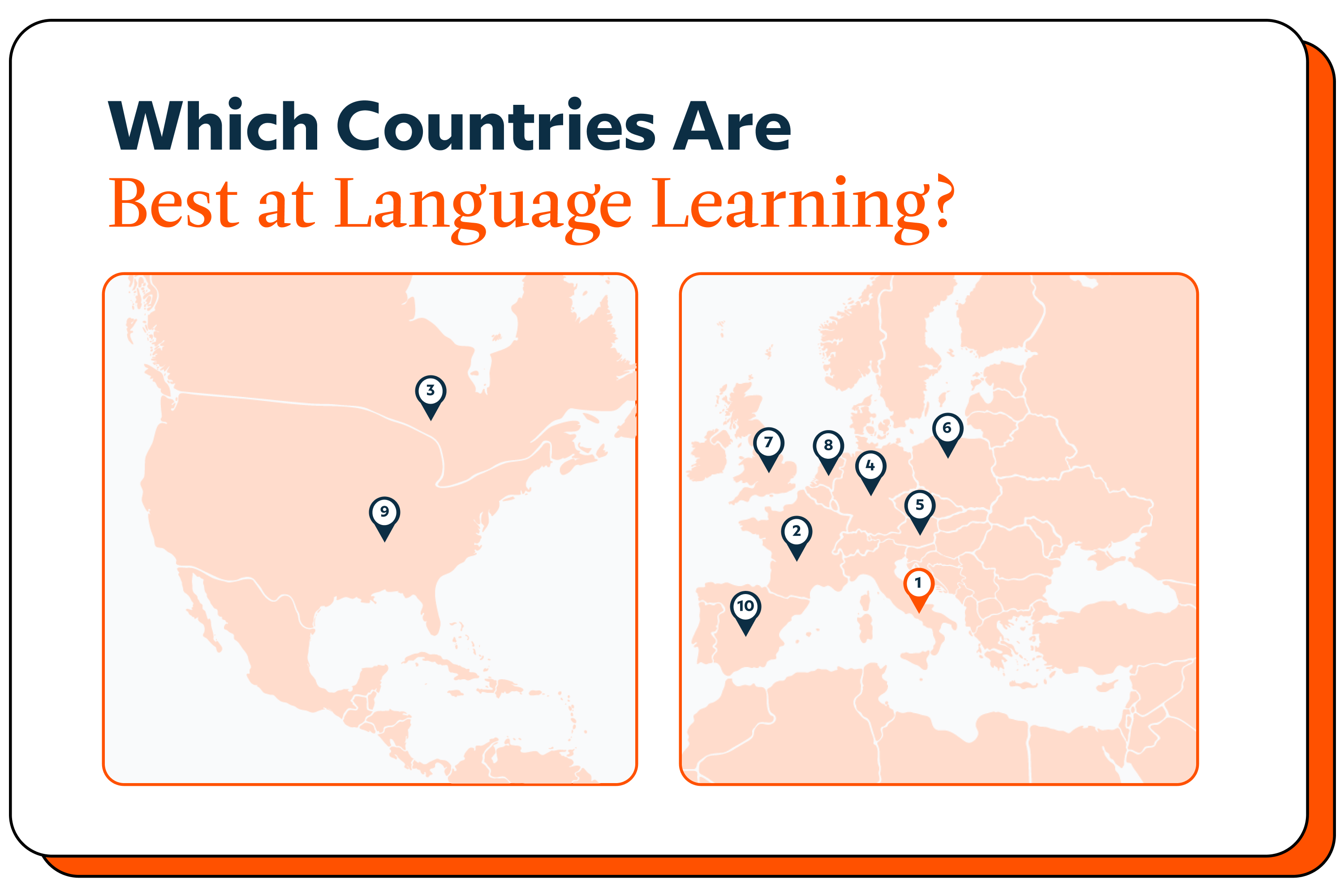
Language learning is hard. Studies have found the failure rate to be as high as 70 to 90 percent — and for those who are successful in learning a second language, research shows geographic location plays a role.
As the world’s top-selling language learning platform, Babbel has a unique view of hot spots for language learning. So, where do the best language learners live? And are some countries really better at language learning than others?
To zoom in on the top 10 countries for language learning across North America and Europe, Babbel looked at the motivation and self-efficacy statistics of millions of its users learning 14 different languages. And the countries with the best language learners are…
Top 10 Countries With the Best Language Learners
Rank | Country |
|---|---|
1 | Italy |
2 | France |
3 | Canada |
4 | Germany |
5 | Austria |
6 | Poland |
7 | U.K. |
8 | Netherlands |
9 | United States of America |
10 | Spain |
What’s behind the list: An important element of the Babbel Method is the proven psychological concept of spaced repetition. With this approach, new information is introduced and repeated over time in intervals, ushering new vocabulary from short- to long-term memory.
In the Babbel app, spaced repetition is all about the “magic ratio” of lessons and reviews. Our analytics team found that learners who complete a 60/40 ratio of lessons and reviews are, statistically, more likely to move forward confidently in creating a habit and reaching their language goals. We like to call this subset of go-getters “super learners.”
The countries above are ranked in order of the highest percentage of super learners. Especially in the case of the top country, Italy, spaced repetition is the secret weapon. Globally, Babbel’s Italian super learners are the most consistent at maintaining a 60/40 ratio of lessons and reviews in the first 20 days of their language learning journey — but the benefits of spaced repetition don’t stop there.
Maybe you’ve heard that it takes three weeks to form a habit? While the 21-day habit “rule” has been debunked as internet clickbait, a psychological study did find that, on average, it takes two months for a behavior to become automatic. Interestingly, Babbel’s Italian super learners, who are the most consistent in the first three weeks, are also the most consistent through month two.
Language-learning is a months- or years-long journey, depending on the level of proficiency a learner seeks — but super learners who develop a strong habit in their first 20 days have been shown to have better long-term adherence and results.
Italy’s Secrets to Success
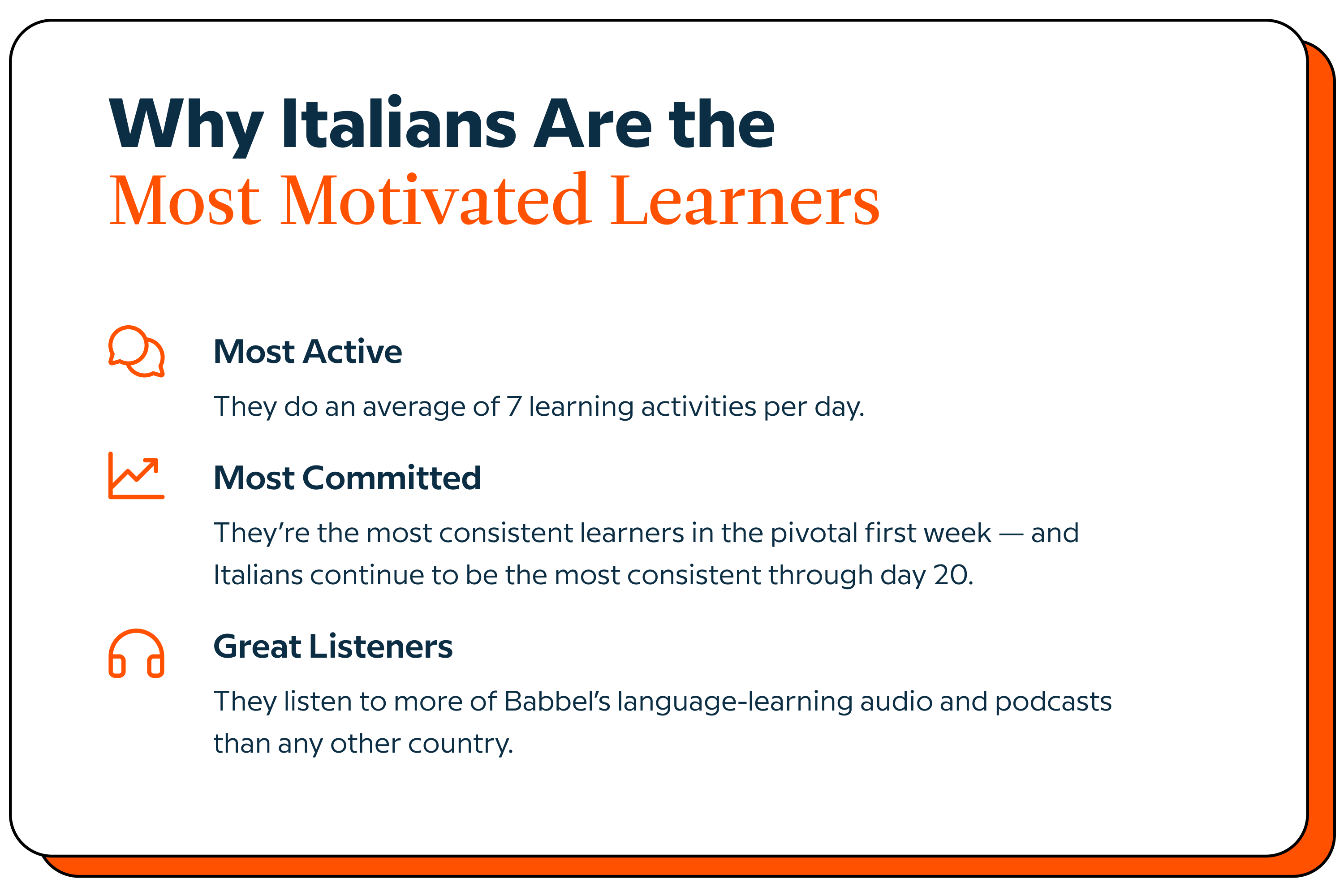
Many people in Western Europe are bilingual, but according to Todd Ehresmann, a linguist and Head of Learning Content at Babbel, “Italians are stereotypically less proficient in English and are more often monolingual as compared to many of their fellow Europeans. Recent statistics show that Italy ranks lower in English proficiency and is in the bottom quarter in terms of self-reported bilingualism." However, this perceived weakness can be used as motivational strength.
“It comes down to: What is your motivation to learn? If it’s ‘I don't want to be one of those Europeans who doesn't speak English,’ that motivation is much stronger than, for example, ‘I'm going on a vacation next week and I want to be able to order some food.’ Because if you don't get around to that, it's not the end of the world. But if you are that Italian who can't hack it in English, that might mean your job,” he explains.
Indeed, career opportunity is a leading motivator for language learning. Along with Poland, Netherlands, and Spain, Italian users of Babbel cite work as their number one reason for learning a new language.
In Italy, the tourism industry represents 8.3% of the country’s total employment. The World Travel and Tourism Council predicts that by 2033, one in seven Italians will work in tourism. Knowing how to speak another language, especially English, can give Italians a leg up at getting one of those tourism jobs, at home or abroad. The need for work likely offers Italian Babbel users true intrinsic motivation.
The Language-Learner Olympics
Looking at the subset of super learners in the top 10 countries, Babbel drilled down into their study habits and characteristics to see how different nations shine.
As the top 10 ranking indicates, Italy takes gold for the big categories of “most learning activities” and “most consistent.” But note the sweeps for Germany and France! We’ll dive into German and French super learners next.
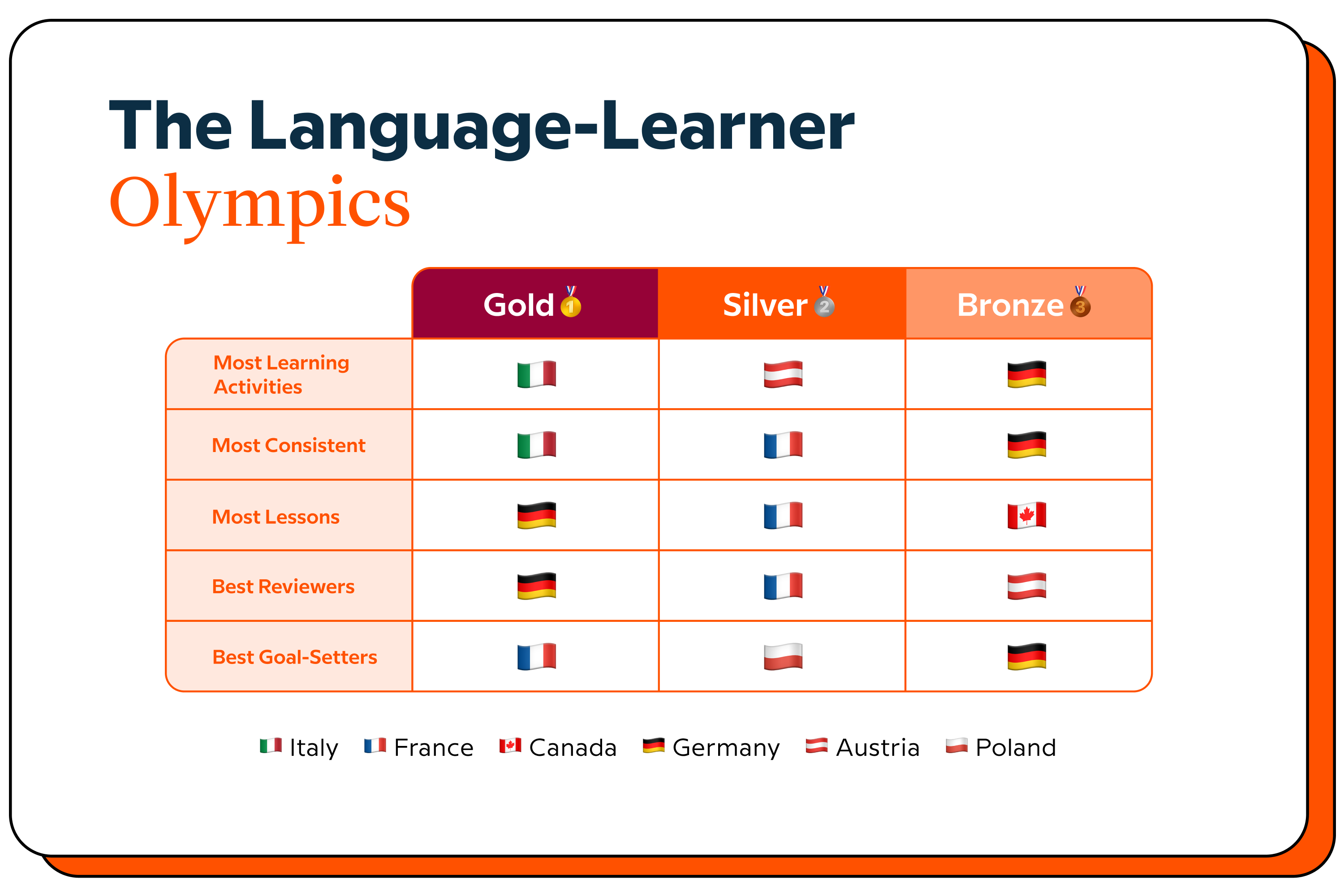
Why France Gets an A+ for Goal-Setting
France, which ranks second overall for super learners, also holds the distinction of being the best at goal-setting. A whopping 75% of French learners set a goal in the Babbel app within their first seven days of learning a new language.
A favorite on the app, Babbel’s Activity Tracker helps learners create a goal-driven learning plan. For example, want to learn basic Italian in one to three months? The Activity Tracker takes this goal and creates a learning plan with options to study for 5, 15, or 30 minutes per day. That’s how Babbel sparks motivation: you set an achievable, flexible goal to start speaking at your desired level. From there, the Tracker will help you chart your progress and stick to your learning plan. That’s how Babbel helps you form a habit.
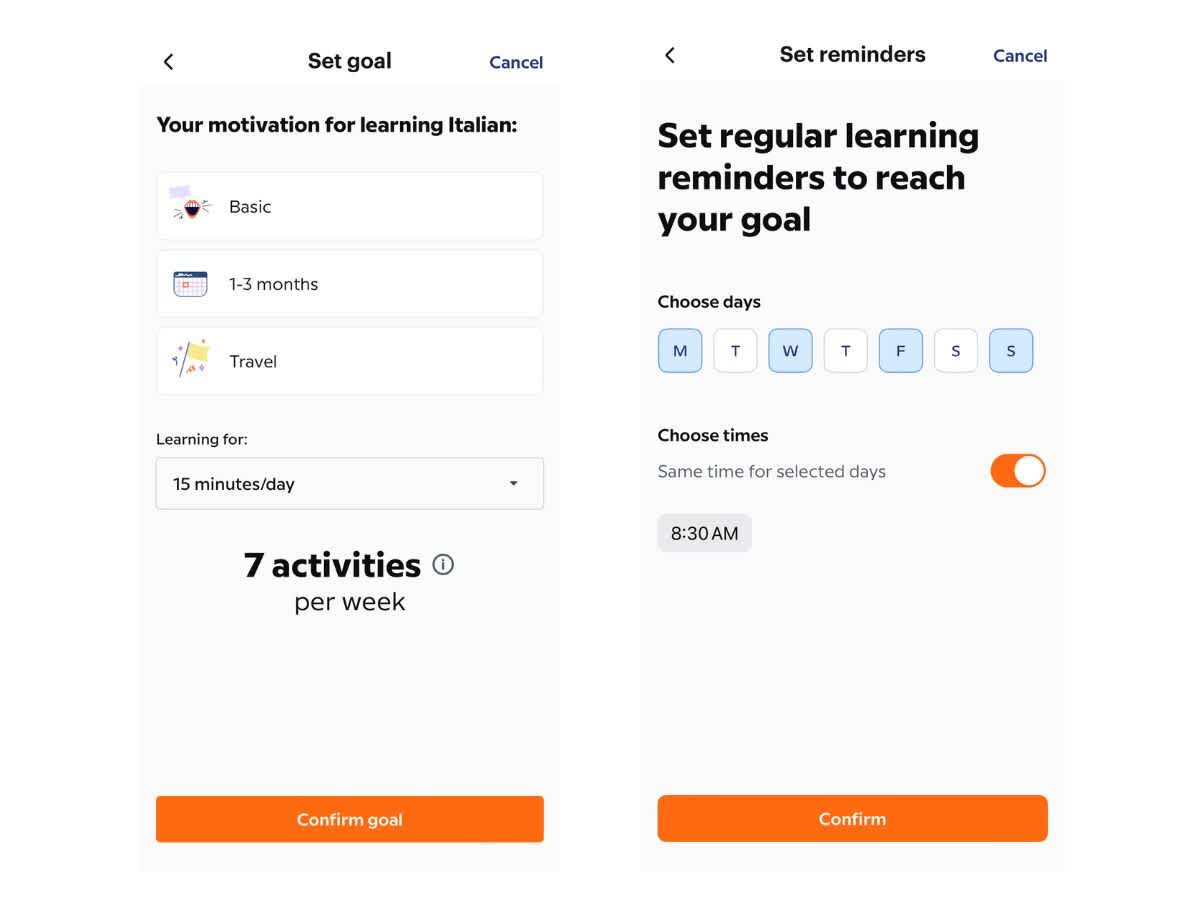
Delphine, a French native using Babbel to learn her third language, Italian, says, “I think motivation is key when learning a new language, but being able to set goals and see your progress keeps the motivation going!”
Delpine used the Activity Tracker to create a weekly schedule for her language learning journey.
“I try to stick to the goals in my Activity Tracker and reward myself when I stay on track. Often, the rewards are something related to the language I’m learning. For example, I would try an Italian treat or dish, buy a book written in Italian, or spend time learning about the culture through music, travel, or films.”
The German Learning Ethic
While Germany has a smaller percentage of super learners than Italy or France, its learning ethic cannot be overlooked. In the chart above, German super learners complete more language lessons and reviews than any other country.
“Germany places more emphasis on language learning in school. Not to mention Germans are prodigious travelers; the country is the biggest tourism spender in the world, followed closely by the United States, United Kingdom, Canada, and France.” Ehresmann says.
Julia, a German native using Babbel to learn her fourth language, Italian, agrees.
“In Germany, language education holds significant importance, primarily focusing on English and often extending to languages like French,” says Julia. “There's a spectrum of language proficiency among Germans. In my circle of friends, many quite comfortably utilize English, particularly in travel contexts.”
For Julia, setting goals and using her new skills whenever she could helped her become fluent in Italian. “I set a flexible learning schedule, allocating specific times each day for lessons and practice … Achievable goals were important for my progress. I aimed for milestones like understanding a movie without subtitles or reading a book in Italian,” she shares.
“With Svenja, another German native learning with Babbel, habit-stacking her Babbel lessons and reviews with exercise was a winning strategy: “I linked everyday activities with the Babbel app. According to scientific knowledge, it takes around 66 days to establish a habit, and the brain automatically remembers when the activity should be done. This means, for me, that every time I get on my exercise bike, I feel the strong urge to do the Babbel app! This really works and is an awesome experience.”
Both Julia and Svenja agree that motivation and consistency were key to their success. “It makes learning a language much easier if you have a ‘why.’ Seeing a sense in what you do makes daily learning a lasting pleasure,” says Svenja.
Debunking Myths About U.S. Language Learners
The United States ranks toward the bottom of the top 10 list of super learners, but that’s not because Americans are bad language learners.
In general, Americans tend to be monolingual: Data from the U.S. Census Bureau shows approximately 23% of Americans are bilingual. That percent may pale in comparison to Sweden, which is 60% bilingual, but it’s close to the 25% average for bilingualism in the European Union. Still, Americans face challenges Europeans don’t when it comes to learning a new language.
For starters, there’s motivation. It’s not as much of a career advantage to be bilingual in America as it is in Europe, as the language in most U.S. workplaces is English. That makes “career” less of a driving force to pick up another language. However, bilingualism will likely become a huge driver of career-motivated language learning in the near future. It’s predicted that the United States will have more Spanish speakers than any other country in the world by 2050. Spanish (both European and Mexican) is already the most popular learning language among Babbel users in the country.
While travel is the top motivation for Babbel’s U.S. super learners, English speakers abound in most popular global travel destinations. Plus, the reality is that at least half of Americans aren’t leaving the United States to begin with: According to market research firm YouGov, 52% of Americans do not have a passport. And for Americans with a passport, longhaul vacation time is thin. The average vacation time for U.S workers is 10-19 days, depending on years of service, according to the United States Bureau of Labor Statistics. Meanwhile, many Europeans have months of vacation and can hop a two-hour flight to be immersed in a new culture and its language.
Americans also tend to be afraid to learn new languages, Ehresmann noted. They don’t believe they can do it, and that myth holds them back: “Many Americans automatically put themselves in this bucket of ‘I can't learn a new language because I didn’t start when I was younger.’”
It’s true that language education in American schools falters. While a median of 92% of European students learn a second language in school, only 20% of American K-12 students are enrolled in a foreign language class, according to Pew Research.
But Ehresmann pushes back, saying, “The fact of the matter is, the more research that gets done on adult language learning vs. child language learning, the more it actually looks like anyone of any age can do it. It's just a matter of creating the right habits and motivations.”
“In terms of innate ability to learn languages, there is nothing about Americans that makes them worse or less prepared to learn a language,” Ehresmann concludes.
In fact, U.S. users have continued to find success through Babbel. Consider that, in 2023, American super learners quadrupled the number of daily learning activities they do in the Babbel app. That achievement indicates more users are feeling comfortable practicing this new skill.
Check out this map of U.S. states with the highest volumes of super learners. Babbel super learners in melting pots like Texas, Florida, California, and New York are living proof that Americans have the same aptitude for language learning as anyone else.
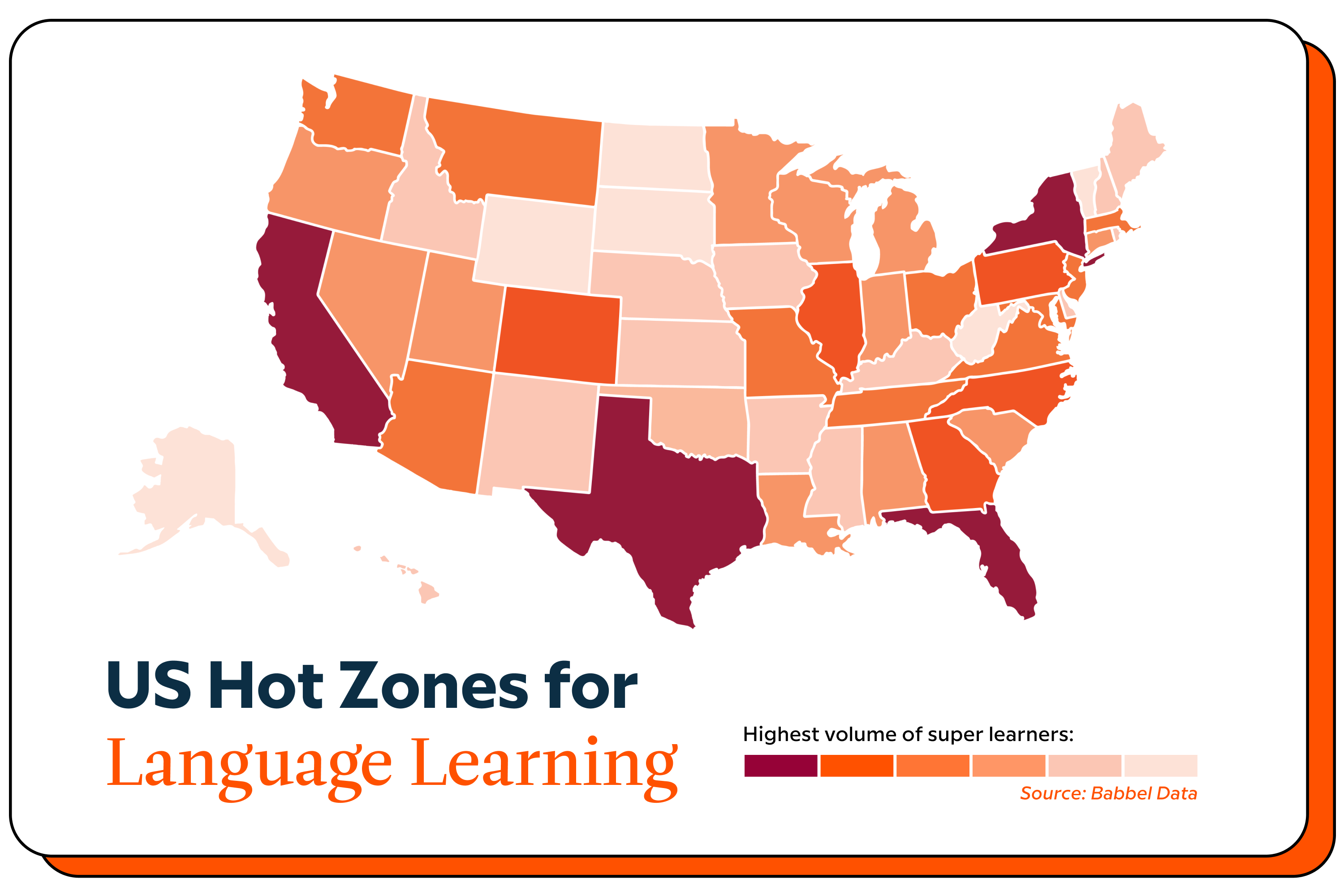
How Super Learners Use Babbel’s Ecosystem To Get Fluent Faster
While lessons and reviews are essential to reach fluency with Babbel, users who interact with other modes of learning also tend to achieve more. For example, top-ranking Italian super learners listen to Babbel audio and podcasts in record numbers compared to other countries.
The Babbel ecosystem is a web of fun learning activities to help you reach your goals without getting bored or burnt out.
Increase comprehension with storytelling podcasts like “Un Día en Español”
Practice talking with AI-powered speech tools
Immerse yourself in real-world scenarios by trying out “Everyday Conversations”
Take live classes with certified language teachers.
“People learn language in all sorts of ways, and by listening to podcasts in another language, learners are interacting with the language in different contexts and modes,” Ehresmann notes. “They aren’t just seeing it written down — they’re hearing the audio or associating it with imagery. This allows them to progress in their journey to fluency.”
Plus, it’s just fun — and that makes learning more enjoyable and doable. That’s what German super learner Svenja credits her motivation to: “Learning must be fun and success must be within reach. I think Babbel makes a good and helpful contribution to improve language learning culture with its playful approach. Follow your joy!”
Are you ready to become a Babbel super learner?